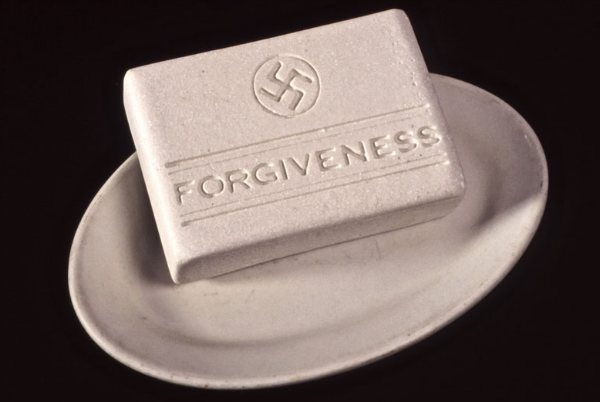
When The Stranger's Jen Graves printed a piece outlining Seattle-based artist Charles Krafft's ideas about white nationalism, exposing that the swastika and Third Reich symbolism in his work isn't a criticism or satire of the associated ideas, Krafft was out of the country, traveling in India. He returned last week and spoke with North American New Righter Greg Johnson in an attempt to clarify what he sees as the media's misconceptions of him and to respond to the widespread media coverage (from Salon, Hyperallergic, The Jewish Daily Forward, and elsewhere) of his work and ideas. Below are some of the more unsettling quotations, spoken by both Krafft and Johnson, from their interview on Counter-Currents Radio.

Forgiveness soap by Charles Krafft, 2012. Courtesy the artist.
On liberals and gentiles:
Krafft: I don't like this meme about me laughing up my sleeve at liberals and subverting their art collections to be repeated in the media because it's not true. I'm not laughing at anybody and I never did laugh at anybody and I don't like being accused of this hoax that they are trying to pin on me.
Johnson: I think a lot of people, especially gentiles just feel like they have to play it safe in this instance.
On swastikas:
Johnson: When it comes to anything about the swastika, Jews are just completely nuts.
Johnson: This is the way that they always react to anybody who is even slightly prominent and has a heretical thought or two.
On alienating friends:
Krafft: I'm now on the spot with old friends who somehow stumbled on this news and I'm getting emails with lines like "say it's not true" or "read it and weep" and some of them have even sat down to let me know how repulsive they think I am now that they know I'm a Holocaust-denying white nationalist. It's hurtful. It hurts.
Johnson: Yeah, I know it's got to hurt. You'd have to have a heart of stone not to be affected by things like that.
On scholarship and aging:
Krafft: How I arrived at these opinions is through scholarship. It isn't as bad as just that I want to gas six million Jews.
Krafft: They did [the media] say after I got my two cents in that I might be senile, that I'm getting to a period of my life where senility might be setting in.
Johnson: Their motto is never forget, obviously, you're starting to get forgetful. That explains it.
On the impact his views should or should not have on the way his art is viewed:
Krafft: Whether or not I'm a Holocaust denier has nothing to do with the art I might be exhibiting.
Krafft: Denial is... an umbrella term that's been weaponized by the Holocaust industry to make everybody that has a doubt about the Holocaust be called a denier and to look stupid. Just to look stupid.
Johnson: Yeah, stupid, crazy or evil. So you call yourself a skeptic?
Krafft: Yeah, a skeptic. I like that term.
Johnson: In terms of white nationalism, what term are you comfortable describing yourself as?
Krafft: A white advocate.
Johnson: And how do you define that?
Krafft: Someone that is racially aware of their whiteness and proud of the achievements of European civilization. That's essentially what I am. A European American who is an advocate for preserving European-American traditions and proud of the accomplishments of European Americans.
On multiculturalism:
Krafft: In a multicultural society, all I'm asking to be left alone to be white. I don't want to reign supreme over the other races. That's about all I want to say. Leave me alone. I don't want to be made to feel guilty for things that I didn't participate in, or haven't had the chance to participate in.
Krafft: We're not allowed to take pride in anything we do because they're worried we're going to start up the gas chambers again.
Krafft: I don't understand this rush to dismantle Western civilization.
On freedom of speech:
Krafft: It's nice that we have a first amendment so that I'm not being charged with a thought crime and possibly tried and then jailed for it. So I feel pretty lucky about that.
On Washington, D.C.'s United States Holocaust Memorial Museum:
Krafft: These people that died in the Holocaust didn't live in America. They didn't die in America and they didn't fight for America so I don't understand why, on Pennsylvania Avenue, they have to have a museum -- this museum of horrors, by the way, planted with all the other monuments to the greatness of the American way of life and American heroes.
Krafft: You know this thing about laying guilt on Americans for not doing enough during World War II? That really chaps my hide. [Laughs.]
On martyrdom:
Krafft: If I don't generate more conversation about the things we've just discussed in the mainstream media, then my martyrdom is going to be for naught.
Krafft: I don't understand why they can't talk about it at The Nation, or some other place because these are issues that I think should be addressed by thinking people.
Johnson: I hope the bastards don't get you down.
-Sara Roffino, BLOUIN ARTINFO
More of Today's News from BLOUIN ARTINFO:
Like what you see? Sign up for BLOUIN ARTINFO's daily newsletter to get the latest on the market, emerging artists, auctions, galleries, museums, and more.